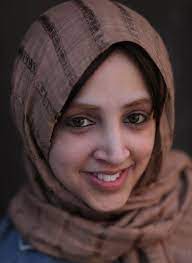Ramadan and Eating Disorders
During the ninth month of the Islamic calendar, Muslims around the world celebrate Ramadan, a time for spiritual devotion and a demonstration of one’s commitment to their faith. Fasting from sunrise to sundown for 30 days, Muslims believe the practice of abstaining from food and water brings them closer to Allah, or God, with all placing this religious event in high regard.
But for those living with eating disorders, Ramadan can become a triggering time, presenting the opportunity to disguise eating disorder behaviors under the pretense of a dedication to faith.
Maha Kahn, founder of an Islam and eating disorders awareness site, War Against Eating Disorders, shares why Ramadan can be an uncomfortable time for Muslims with eating disorders and how to get support.
Maha’s Experience

“For more than fifteen years of my life I’ve suffered with an eating disorder. My disorder was insidious, gradual and inexorable. Before I was diagnosed with my eating disorder, Ramadan was always the month for me to lose weight.
My mind was conditioned from my teenage years to see Ramadan as such. After diagnosis, not fasting was horrible and my ED was getting worse. I just wanted Ramadan to be about hunger and starvation. Going through the treatment, I became so focused on explaining my ED and trying to make sense of it. But there was nothing out there.
I remember I went from London to Exeter, a 300km journey, to see an imam [a leader of Islamic worship] because I wasn’t getting an answer.
“If you’re ill, you don’t fast. You’re exempted,” he told me.
My work on raising awareness started from my home in Surrey, UK in 2012. I wanted to understand eating disorders, why they are on the rise, and what does Islam say about it?
In order to break the silence in Muslim culture, I went on the Islam Channel on 16th September 2013 and spoke about my struggles and my journey. Since 2013, I’ve dedicated myself to changing the way our society perceives eating disorders.
Eating disorders are uncomfortable, but Muslims can’t ignore the reality of this mental illness. This is my mission in life: to keep engaging in this war against eating disorders, and to help create effective accessible solutions to this destructive illness.
Q: Why can Ramadan be a challenging time for those living with eating disorders?
Ramadan is a period of prayer and fasting. During Ramadan, Muslims have one meal known as suhoor, just before sunrise, and an evening meal, iftar, after the sunset. It’s this prolonged month of fasting, with set timings of meals and complete abstention from drinks, that has proved a challenge for people with eating disorders.
“ It becomes difficult to differentiate whether you are fasting for God or fasting for your eating disorder, and the whole process of this can be incredibly overwhelming to manage.” – Ammaarah Zayna
Most Muslims will approach Ramadan as a month of redemption, healing and blessings, and not all Muslims who fast for 30 days will have an eating disorder. But for those that do, as soon as the Ramadan fast opens, many of them fall into the vicious and destructive cycle of ED behaviours; many binge and then purge, and others abide by the fasting practice and restrain food, thereby causing further harm to their already malnourished bodies.
Why do people fast and does everyone have to partake?
The month of Ramadan changes each year with the lunar cycle. For this time, Muslim’s practice fasting from sunrise to sundown to demonstrate a dedication to their faith above all other cravings and external influences, the discomfort of fasting resulting in patience and discipline.
It is a time of soul searching and gratitude, with many acknowledging their blessings by experiencing the hunger and thirst of the less fortunate.
Fasting is one of the five core beliefs and practices of Islam, making it a mandatory practice for the 1.8 billion Muslims around the world. However, there are exceptions for children, pregnant women, old people, and those that are ill or sick.
Unfortunately, it is often not common knowledge that eating disorders and other mental health issues fall under this umbrella of illness, leaving many to suffer in silence during this period.
“I struggle to feel connected to my religion when my experience becomes less about internal reflection and more about the mind-game of seeing how long I can resist food.” – Dahaba Ali Hussen
Can Muslims with eating disorders take part in Ramadan safely?
Before you decide to fast for Ramadan, ask yourself this question: Who am I fasting for? Allah, or my eating disorder?
Those who suffer from eating disorders should consult their Doctor before fasting. Fasting does create a medical challenge, and due to potential health complications, you do not have to fast if it is not safe to do so.
“A lot of attention is given to food during Ramadan – if you’re not abstaining from it, then you’re eagerly anticipating it – and for someone battling a difficult relationship with food, this can create a very triggering and toxic environment.” Ammaarah Zayna
Allah is not in need for us to stay hungry or to starve ourselves. What matters before Allah is us, our good character and our good deeds. You know you’re ill, you know you cannot stop your eating disorder at this stage, you know you need help.
Don’t forget you are still engaging in the spirit of Ramadan and you will still receive the same reward. This is really a time for you to dive deep into who you are and learn about yourself.
You will be performing a great deed. You will be taking care of your health, your spirit and your mind. Recovery from an eating disorder is indeed a journey and not a destination.
Each day you commit to your recovery and fight your eating disorder, you are lessening the stronghold it has over you and empowering yourself to truly find freedom and lasting happiness.
How can people let their family know that participating in Ramadan may bring up uncomfortable or triggering feelings?
It’s hard to explain to your family your illness and your emotional state. As eating disorder sufferers comes in all shape and sizes, you may look fine to them, but in reality your mental health could be another story.
Talk to them in advance. It’s challenging to reveal your illness, your fears, your thoughts, but it’s something that needs to be done.
The more aware they are of your needs, the more confident and willing they will be to help you. Or if you can identify a member of family or a friend that you can confide in, enlist their support and ask them to let your family about your challenges during the month of Ramadan.
You could also make the situation easier by writing down what might make things less stressful for you in Ramadan. Write out a list and share it with your family. This could help you to negotiate ways of having your needs met.
Present your list as your coping tools so that others may engage positively to support you in using them. Encourage your family to learn about this mental illness. You can refer them to online resources, or family members can get in touch with us and we can direct them to a local Imam. Awareness and education are a must and it’s easily accessible.
Help, Support and Further Resources:
War Against Eating Disorders: Information, self-help tools and support groups. Eating Disorders Ramadan Guide – Healthy Ramadan, Healthy You
Middle East: Middle East Eating Disorders Association (MEEDA) – Provides information and a helpline including a directory of psychologists, dieticians, and doctors that understand eating disorders.
UK: Muslim Youth Helpline – Faith and culturally sensitive support via phone, live chat, WhatsApp or email.
USA: Naseeha Mental Health Hotline for Muslims, 7 days a week (12pm-9pm EST). 1 (866) 627-3342, info@naseeha.org
Muslims and Eating Disorders: An online resource and safe, public platform to learn about these issues and get support.
Based in the United Kingdom, Maha Khan is a Muslim and was diagnosed with Anorexia after finishing her Masters degree. The illness had been present since she was fifteen, and after struggling with this illness for more than a decade, Maha started her own blog, to raise awareness of eating disorders in Muslim communities. The aim behind this website was the vast information gap with eating disorders in Muslim communities.
Since its inception in 2012, War Against Eating Disorders has become a platform for Muslims to seek advice on Eating Disorders, to explore avenues of help and to embark on a journey of discovery and healing with on-going support.
Maha believes this is the mission in her life: to keep engaging in this war against eating disorders, and to help create effective, accessible solutions to this destructive illness.
Get help in your language
If English is not your first language and you’re located in Australia, we can still help.
To access our Helpline call 131 450 to speak through an interpreter.





















